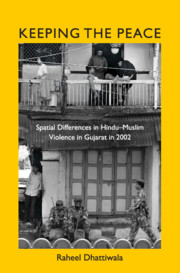Book contents
- Frontmatter
- Dedication
- Contents
- List of Tables
- List of Images
- List of Figures
- Preface
- Acknowledgements
- 1 Explaining Variation in Violence: An Introduction
- 2 Peace and Violence: Concepts and Theory
- 3 The Political Logic of Violence: Anti-Muslim Pogrom in Gujarat
- 4 Ahmedabad
- 5 Spatial Configuration: Variation in Violence across Neighbourhoods
- 6 Monitoring and Control in Two Peaceful Neighbourhoods
- 7 So Near, and Yet So Far: Group Relations between Victims and Perpetrators of Violence
- 8 The BJP's Muslim Supporters in Ahmedabad
- 9 Ethnic Violence: Connecting the Macro with the Micro
- Bibliography
- Index
8 - The BJP's Muslim Supporters in Ahmedabad
Published online by Cambridge University Press: 26 April 2019
- Frontmatter
- Dedication
- Contents
- List of Tables
- List of Images
- List of Figures
- Preface
- Acknowledgements
- 1 Explaining Variation in Violence: An Introduction
- 2 Peace and Violence: Concepts and Theory
- 3 The Political Logic of Violence: Anti-Muslim Pogrom in Gujarat
- 4 Ahmedabad
- 5 Spatial Configuration: Variation in Violence across Neighbourhoods
- 6 Monitoring and Control in Two Peaceful Neighbourhoods
- 7 So Near, and Yet So Far: Group Relations between Victims and Perpetrators of Violence
- 8 The BJP's Muslim Supporters in Ahmedabad
- 9 Ethnic Violence: Connecting the Macro with the Micro
- Bibliography
- Index
Summary
This was during the days after the Babri Masjid demolition in 1992. Then chief minister of Gujarat, Chimanbhai Patel, was looking for a Muslim police officer to get a hold on the tension in Surat. He called upon the services of A I Saiyed (real name), a senior police officer posted as deputy municipal commissioner in Ahmedabad. Saiyed told him: ‘When I put on the uniform, I am not a Muslim police officer. I am just an officer, and my caste and creed stay at home.’ He was not asked again. Saiyed retired as the additional director general of police (DGP) of Gujarat a few years later. Today, not many remember him for this incident which he penned in 2008 in a newspaper article. Most, however, do remember him as the man who could have been the ‘ first Muslim mayor of Ahmedabad under the BJP’ after municipal elections in 2010. Saiyed lost the election but managed to create enough recall with his 13,000-odd votes, presumably of Muslims, in Sarkhej ward so as to be most likely picked as the Hindu nationalist BJP's Muslim candidate in the December assembly elections in 2012. But the BJP's candidates list that year did not provide representation to any Muslim. Despite that, Saiyed aspired to hold the hands of his co-religionists to a brighter future of quality education and healthcare, one in which ‘we are no longer seen as a homogenous mass of illiterate people who refuse to assimilate’. ‘Only with education can Muslims realize what's best for them,’ he had said to me a few days before the BJP had declared its candidates, as we sat over a cup of tea in his house in Juhapura. The transformation was telling: a police officer who refused to use his religious identity as a bargaining tool had found a reason to join a right-wing political party and do just that as the only hope for the betterment of his community. In 2017, when I met him again, I did not find the same zeal in him. His stoicism intact, he still called himself a BJP supporter but not someone who could be considered for candidature anymore. Political times were different by then. Modi was now the Prime Minister of India, though any hopes of Muslims like Saiyed to find political representation had long been destroyed.
- Type
- Chapter
- Information
- Keeping the PeaceSpatial Differences in Hindu–Muslim Violence in Gujarat in 2002, pp. 147 - 164Publisher: Cambridge University PressPrint publication year: 2019



